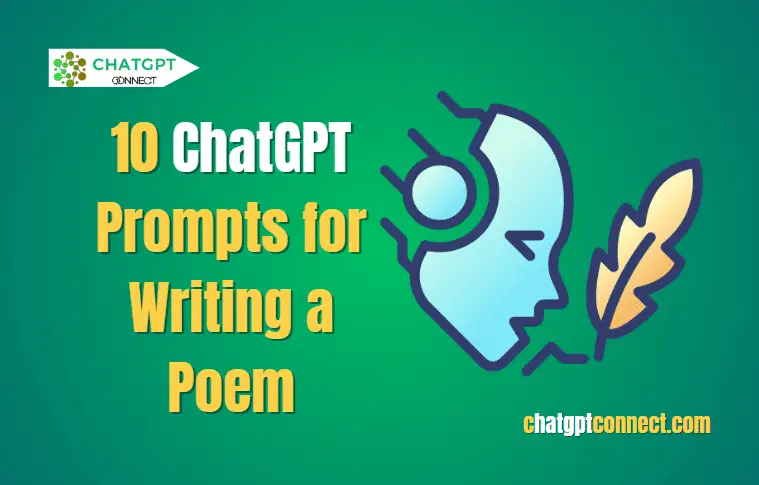Poetry is a powerful form of artistic expression that evokes emotions, tells stories, and captures the world’s beauty. It allows for creative freedom and self-expression and is a timeless way to communicate with others. However, the process of writing a poem can be daunting, especially if you’re struggling with writer’s block or lack inspiration. In this article, we’ll provide you with ten ChatGPT prompts for writing a poem with artistry, which will help you unleash your creativity and produce a stunning piece of work.
Understanding Poetry
Poetry is a genre of literature that uses figurative language and imagery to create a rhythmical and emotional experience for the reader. It can take on many different forms, such as haikus, sonnets, and free verse. However, regardless of the form, poetry is intended to communicate a message or emotion to the reader through the power of words.
The Power of Artistic Expression
Artistic expression is a fundamental aspect of the human experience. It allows us to explore our emotions, communicate our thoughts, and make sense of the world around us. Poetry is a form of artistic expression that can be used to capture the essence of a moment, evoke powerful emotions, and connect with others on a deep level.
Why Use ChatGPT Prompts for Writing a Poem?
If you’re looking for inspiration for your next poem, using ChatGPT prompts can be a great way to jumpstart your creativity. Here are some reasons why using ChatGPT prompts for writing a poem can be beneficial:
- Overcoming Writer’s Block: Writer’s block can be a frustrating and discouraging experience for any writer. Using ChatGPT prompts can help you to break through the block and get your creative juices flowing.
- Stimulating Creativity: Sometimes, we need a little push to come up with new and exciting ideas. ChatGPT prompts can provide that push and stimulate your creativity in unexpected ways.
- Exploring New Topics: Writing poetry is a great way to explore different topics and themes. ChatGPT prompts can introduce you to new and interesting subjects that you may not have considered otherwise.
- Encouraging Experimentation: ChatGPT prompts can encourage experimentation with different styles, structures, and forms of poetry. This can help you to expand your skills as a poet and develop a unique voice.
- Saving Time: Coming up with ideas for a new poem can be time-consuming. ChatGPT prompts can save you time and help you to get started on your writing more quickly.
Overall, using ChatGPT prompts for writing a poem can be a valuable tool for any poet. Whether you’re struggling with writer’s block or just looking for a new and exciting challenge, ChatGPT prompts can provide the inspiration you need to create your next masterpiece.
10 ChatGPT Prompts for Writing a Poem with Artistry
1. Nature’s Beauty
Nature is a powerful source of inspiration for poets. From the majestic mountains to the ocean’s rolling waves, there is beauty all around us. Use your senses to describe the sights, sounds, smells, and textures of nature in your poem.
2. Love and Heartbreak
Love and heartbreak are universal experiences that have inspired countless poets throughout history. Write a poem that explores the highs and lows of love and relationships.
3. Memories
Memories are a powerful source of inspiration for poets. Use your memories as a starting point to create a poem that captures the essence of a specific moment in time.
4. Self-Reflection
Self-reflection is an essential part of personal growth and development. Use poetry as a tool for self-expression and introspection by exploring your thoughts, feelings, and experiences.
5. Humanity and Society
As social creatures, we are deeply impacted by the world around us. Use poetry as a means to explore the complexities of humanity and society.
6. Dreams and Imagination
Dreams and imagination are limitless sources of inspiration for poets. Use your creativity to explore the possibilities of the unknown and let your imagination run wild.
7. Seasons and Weather
The changing seasons and weather patterns are a great source of inspiration for poets. Use your senses to describe each season’s sights, sounds, smells, and textures in your poem.
8. Overcoming adversity
Overcoming adversity is a universal theme that has inspired countless poets throughout history. Use poetry as a means to explore the struggles and triumphs of the human experience.
9. Travel and Adventure
Travel and adventure are exciting and transformative experiences that can inspire great poetry. Use your experiences exploring new places, meeting new people, and trying new things as a starting point for your poem.
10. Inspiration and Creativity
Sometimes, the best inspiration comes from within. Use poetry as a tool to explore your own creativity and to inspire others to do the same.
Tips for Writing Poems with Artistry
- Start with a clear idea or concept: Before you begin writing your poem, make sure you have a clear idea or concept in mind. This will help guide your writing and keep your poem focused.
- Use sensory language: Use descriptive language that appeals to the senses (sight, sound, touch, taste, and smell) to create a vivid image in the reader’s mind.
- Experiment with form: Poetry comes in many different forms, from sonnets to free verse. Experiment with different forms to find the one that works best for your message.
- Edit and revise: Once you’ve written your poem, take some time to revise and edit. This will help you refine your message and ensure that your poem is as powerful as possible.
- Read other poets: Reading the work of other poets can help you develop your own style and inspire new ideas.
How to Edit and Refine Your Poem
Once you have completed your poem using one of the ChatGPT prompts, it is important to edit and refine it to ensure it is the best version of itself. Editing and refining your poem will help you to clarify your ideas, improve the structure, and enhance the overall quality of your work. Here are some tips on how to edit and refine your poem:
- Take a Break: After you have completed your poem, take a break from it. This will allow you to approach your work with fresh eyes and gain a new perspective on your writing.
- Read Your Poem Aloud: Reading your poem aloud will help you to identify any awkward phrasing, grammatical errors, or other issues. It will also help you to identify areas where you may need to adjust the rhythm and pacing.
- Focus on Your Word Choices: Word choice is crucial in poetry. Make sure that every word in your poem serves a purpose and is adding to the overall meaning and impact of your work. If a word is not necessary, consider removing it.
- Check Your Line Breaks: Line breaks can make or break a poem. Make sure that your line breaks are intentional and are serving a purpose in your poem. Experiment with different line breaks to find the best option.
- Consider the Structure: The structure of a poem can vary depending on the style and content. However, a well-structured poem should have a clear beginning, middle, and end. Make sure that your poem flows logically and that the structure enhances the overall impact of your work.
- Seek Feedback: Getting feedback from others can be incredibly helpful in improving your poem. Share your work with trusted friends, family, or writing groups to get constructive feedback and suggestions for improvement.
- Revise and Repeat: Editing and refining your poem is an ongoing process. Once you have received feedback and made adjustments, revise your work and repeat the process until you are satisfied with the final product.
By following these tips, you can edit and refine your poem to make it the best version of itself. Remember, editing is an important part of the writing process and can help you to produce a truly impactful and meaningful piece of poetry.
Conclusion
Poetry is a powerful form of artistic expression that can be used to communicate a message, evoke emotions, and capture the world’s beauty. These ten prompts can help you write a poem with artistry, whether you’re a seasoned poet or just starting out. Remember to experiment with different forms, use sensory language, and edit and revise your work to ensure that your poem is as powerful as possible.
FAQs
- What is the best way to start writing a poem?
Start with a clear idea or concept in mind, and then experiment with different forms and techniques to bring your message to life.
- How can I make my poem more powerful?
Use sensory language, experiment with form, and edit and revise your work to ensure that your message is clear and impactful.
- How can I develop my own poetic style?
Read the work of other poets, experiment with different forms and techniques, and keep writing until you find your unique voice.
- Is there a “right” way to write a poem?
No, there is no one “right” way to write a poem. Poetry is a highly personal and subjective form of artistic expression, and what works for one poet may not work for another.
- Where can I find more prompts for writing poetry?
Many resources are available online for finding poetry prompts, including writing blogs, social media groups, and writing communities.


